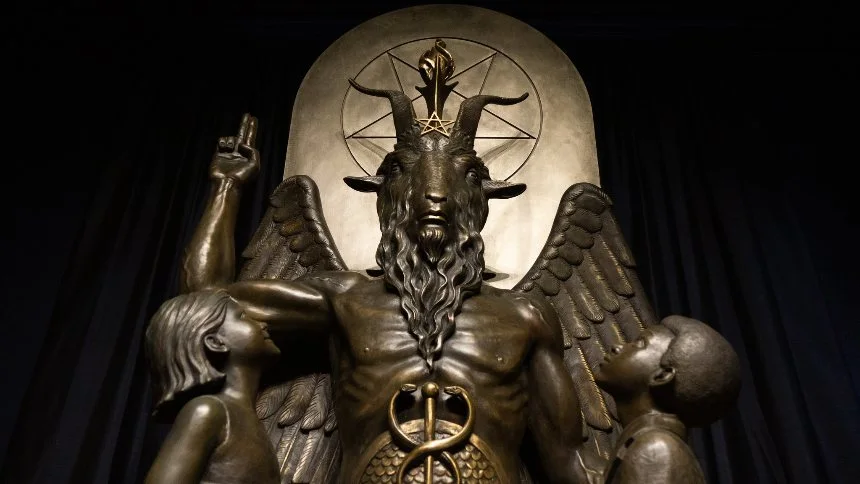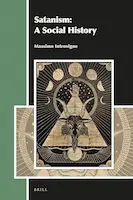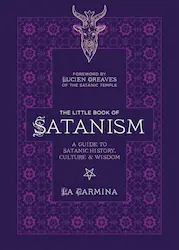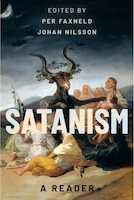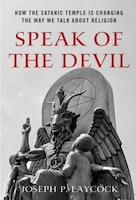In the realm of religious movements, Satanism and political activism form a unique and captivating intersection. Modern, or contemporary Satanism, emerging in the mid-20th century, has evolved into a multifaceted belief system that challenges societal norms and traditional religious structures. While it is often misunderstood or mischaracterized, Satanism plays a significant role in advocating for change, particularly within the realm of politics.
At the heart of this intricate relationship lies a profound exploration of identity, individual rights, and political discourse. Satanism, with its emphasis on personal autonomy and skepticism towards authority, has become a powerful tool for advocating change and amplifying the voices of marginalized communities.
One must recognize that modern Satanism is not a monolithic entity but rather a diverse spectrum of beliefs and practices. It encompasses various schools of thought, including theistic Satanism, atheistic Satanism, each with its own interpretations of satanic symbolism and philosophy. While theistic Satanists may venerate Satan as a deity, atheistic Satanists often view Satan as a symbol of individualism and rebellion against oppressive systems.
Within this complexity, the common thread is a challenge to prevailing norms and a commitment to personal freedom. This commitment extends into the realm of politics, where Satanists engage in various forms of activism to promote their ideals and advocate for social change.
Modern Satanism’s subversion of traditional religious and societal norms is, at its core, a political act.
From its inception, the Satanic Temple has used a variety of methods to push for political transformation. From staging public rituals to launching legal challenges, the group has leveraged its unique identity and belief system to challenge oppressive systems and advocate for human rights. One notable example is its campaigns for religious pluralism and reproductive rights, using satanic symbolism to challenge the dominance of certain religious perspectives in the political sphere.
As we delve deeper into the intricate relationship between Satanism and political activism, we will explore the ways in which Satanists have become vehicles for political engagement. We will examine their impact on political discourse, their role in advocating for individual rights and freedoms, and the implications of their activism on the broader landscape of politics and human rights. This exploration will reveal the nuanced and often misunderstood dynamics of Satanism and political activism, shedding light on a provocative intersection that continues to challenge the status quo.
Defying Tradition: A Political Act
At the heart of modern Satanism lies a profound challenge to conventional norms. This movement, exemplified by organizations like the Satanic Temple, uses the symbolism of Satan as a tool to deconstruct established power structures and to advocate for individual freedoms. It is a form of “serious parody” that wields humor as a powerful weapon while providing a serious philosophical and identity-based framework.
Modern Satanism’s subversion of traditional religious and societal norms is, at its core, a political act. By adopting the symbol of Satan, a figure historically associated with rebellion and defiance, Satanists signal their rejection of dominant ideologies and power structures. This symbolic choice serves as a powerful critique of religious and political institutions that seek to control and regulate individual beliefs and behaviors.
One of the key aspects of satanic political activism is its use of humor and satire to challenge authority. The Satanic Temple, for example, has staged public actions and campaigns that employ a satirical approach to draw attention to issues like religious freedom and reproductive rights. By using humor, they not only engage the public but also expose the absurdity of certain political and religious positions. In doing so, they highlight the importance of critical thinking and rational discourse in the political arena.
Moreover, modern Satanism emphasizes the value of individualism and personal autonomy, which are foundational principles of many democratic societies. Satanists argue that individuals should have the freedom to make their own choices, even if those choices diverge from societal norms or religious doctrines. This emphasis on personal freedom aligns with broader political movements advocating for civil liberties and human rights.
The satanic movement’s political activism extends beyond symbolism and rhetoric. It often involves legal challenges aimed at promoting religious pluralism and upholding the separation of church and state. By utilizing the legal system to challenge discriminatory practices, Satanists contribute to the ongoing struggle for equal rights and protections.
Satanism and Human Rights: A Legal Battle
Modern Satanism sees a compelling and highly relevant intersection with politics through legal battles, especially those concerning human rights. One notable instance of this engagement unfolded in 2015 when a member of the Satanic Temple accused a St. Louis clinic of attempting to dissuade her from undergoing an abortion. This incident served as the catalyst for the “Religious Reproductive Rights” campaign, an illuminating case study that underscores the intricate connection between religion, politics, and women’s rights.
Political activism can take on many forms, and seemingly unconventional alliances can be a potent force for change.
The “Religious Reproductive Rights” campaign, initiated by the Satanic Temple, represents a striking example of how Satanists utilize the legal system to champion human rights causes. In this instance, the organization invoked the First Amendment’s Establishment Clause, asserting that the clinic’s actions were influenced by religious beliefs that intruded upon a woman’s fundamental right to make decisions regarding her own body. This legal challenge brought to the forefront the issue of reproductive rights, emphasizing that it transcends individual choices and extends into the realm of political and legal contention, where religious ideologies can clash with personal freedoms.
The intersection of religion and politics within the context of reproductive rights constitutes a complex and contentious matter. Modern Satanists, armed with their distinctive perspective, have effectively employed the legal system to challenge attempts to impose religious doctrines on matters of personal autonomy. Through such actions, they have contributed to the broader discourse on the separation of church and state, asserting that religious principles should not dictate public policy or encroach upon individual rights.
Furthermore, the “Religious Reproductive Rights” campaign underscores the significance of activism in contemporary politics. It demonstrates that Satanists, often marginalized and misunderstood, possess the capacity to advocate for human rights and social justice through strategic legal maneuvers. This highlights the importance of diverse voices in the political arena and the vital role that unconventional movements can play in shaping public policy.
Political Alliances and LGBTQ+ Support
In the realm of modern Satanism, intriguing alliances have formed, transcending the boundaries of conventional religious and political affiliations. One such alliance, which has garnered significant attention, is the collaboration between modern Satanists and the LGBTQ+ community. This unexpected convergence of interests is grounded in a shared commitment to challenging established religious doctrines and societal norms surrounding gender and sexuality.
Organizations like the Satanic Temple have emerged as prominent advocates for LGBTQ+ rights and supporters of the community’s initiatives. Their active participation in LGBTQ+ pride marches and events serves as a testament to their dedication to the cause. At first glance, this collaboration may appear unlikely, but upon closer examination, it becomes evident that both groups share a common thread in their defiance of mainstream religious institutions’ traditional views on gender and sexuality.
Within the realm of modern Satanism, a diversity of perspectives and beliefs exists, giving rise to internal conflicts and debates.
The LGBTQ+ community has long been engaged in a struggle for recognition, equality, and acceptance in a world where heteronormativity often dominates. Modern Satanists, too, find themselves at odds with societal norms, frequently labeled as outsiders due to their unorthodox beliefs and practices. This common experience of marginalization has forged a unique bond between these seemingly disparate groups.
At the heart of this alliance is a shared commitment to challenging and deconstructing the rigid constructs of gender and sexual identity perpetuated by mainstream religious institutions. While traditional religious doctrines have often been used to stigmatize and discriminate against LGBTQ+ individuals, modern Satanists offer an alternative perspective—one that embraces diversity, individuality, and freedom of expression.
By joining forces with the LGBTQ+ community, modern Satanists amplify their message of defiance against oppressive religious ideologies and promote the importance of embracing one’s true self. They recognize that the struggle for LGBTQ+ rights is not only a social issue but also a political one, where entrenched religious beliefs can hinder progress.
This alliance challenges the traditional power structures and norms that have long dictated societal attitudes toward gender and sexuality. It serves as a reminder that political activism can take on many forms, and seemingly unconventional alliances can be a potent force for change. As we explore the intersections of modern Satanism with politics, religion, and human rights, this alliance with the LGBTQ+ community exemplifies the movement’s commitment to reshaping the landscape of contemporary politics and advocating for a more inclusive and equitable society.
Internal Conflicts and Inclusivity
Within the realm of modern Satanism, a diversity of perspectives and beliefs exists, giving rise to internal conflicts and debates. While the Satanic Temple stands as a prominent example of a progressive and inclusive satanic organization, it is important to acknowledge that not all Satanist groups share the same ethos.
One notable conflict has emerged between the Satanic Temple and the Church of Satan, representing differing stances on issues related to gender inclusivity and conservatism. These internal disputes mirror the broader societal discussions around identity, gender, and the delicate balance between challenging established norms and maintaining inclusivity.
Modern Satanism has evolved into a powerful vehicle for political activism, challenging established norms and advocating for individual rights.
The Satanic Temple has positioned itself as a champion of inclusivity, actively embracing individuals of various gender identities and orientations. This stance reflects their commitment to providing a welcoming space for all who seek to challenge traditional religious and societal structures. However, this progressive approach has not been without its challenges and disagreements within the broader satanic community.
Conversely, the Church of Satan, founded by Anton LaVey, has often been perceived as more conservative and traditional in its views on gender roles and identity. This contrast in ideologies has sparked tensions and debates, leading to a divergence in the satanic movement.
These internal conflicts within Satanism raise essential questions about the movement’s future direction. They force practitioners and organizations to confront the complex interplay between pushing the boundaries of societal norms and maintaining a sense of inclusivity within their respective communities.
As modern Satanism continues to evolve and adapt to contemporary societal challenges, these internal disputes serve as a reminder of the multifaceted nature of the movement. While it shares a common thread of defiance against traditional religious institutions and oppressive norms, the diverse perspectives within Satanism highlight the ongoing struggle to define its identity and principles.
Satanism and Political Activism in the Modern Era
In conclusion, modern Satanism has evolved into a powerful vehicle for political activism, challenging established norms and advocating for individual rights. Organizations like the Satanic Temple have leveraged the symbolism of Satan to deconstruct traditional power structures, leading to a redefinition of identity, gender, and sexuality. The movement’s engagement with issues like reproductive rights and LGBTQ+ support highlights its intersection with broader political debates.
Satanism’s role as a political force should not be underestimated. It embodies a form of “serious parody,” using humor to confront societal expectations while offering a serious philosophical framework. However, internal conflicts within Satanist groups over inclusivity and conservatism demonstrate the ongoing debates within the movement.
In the ever-evolving landscape of politics, religion, and human rights, modern Satanism serves as a compelling case study of how unconventional beliefs and practices can influence the political discourse. It challenges the status quo, defies tradition, and champions individuality.
As society continues to grapple with issues of identity and personal freedom, modern Satanism’s unique blend of political activism and religious symbolism will undoubtedly remain a topic of intrigue and debate. It reminds us that in the realm of politics, even the most unconventional voices can play a significant role in shaping the future.
This piece has been adapted from the author’s dissertation.


